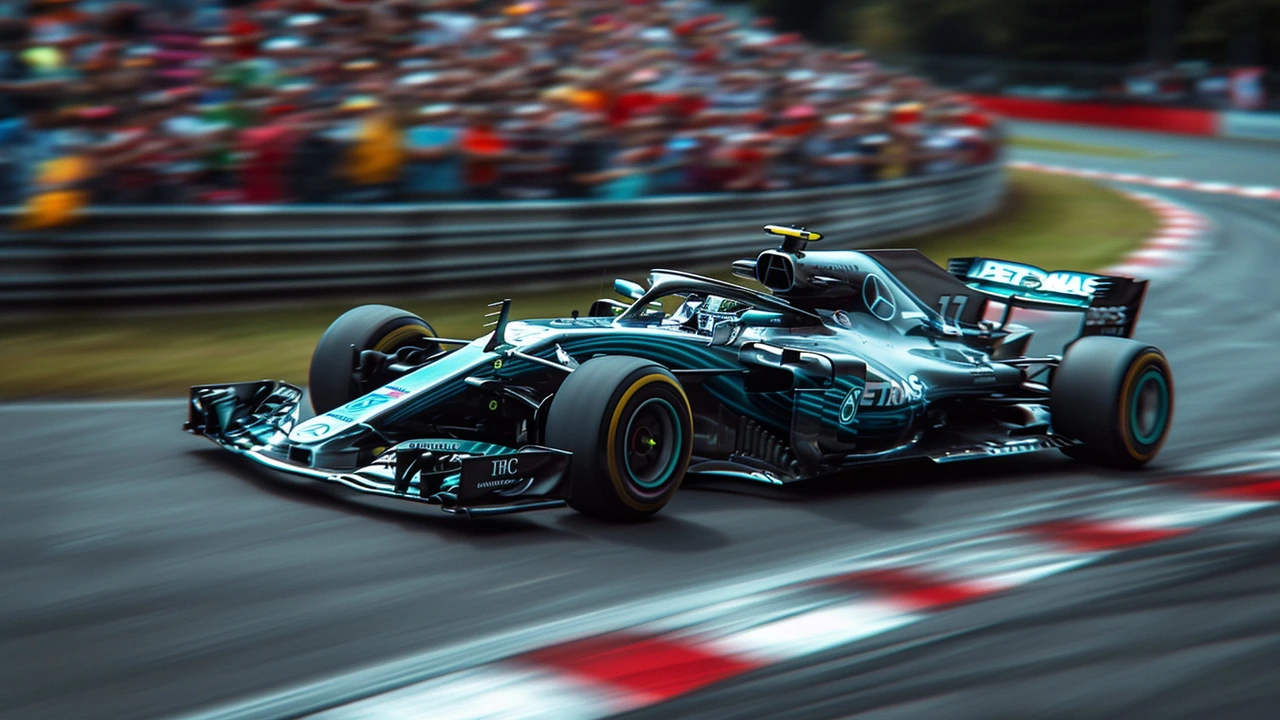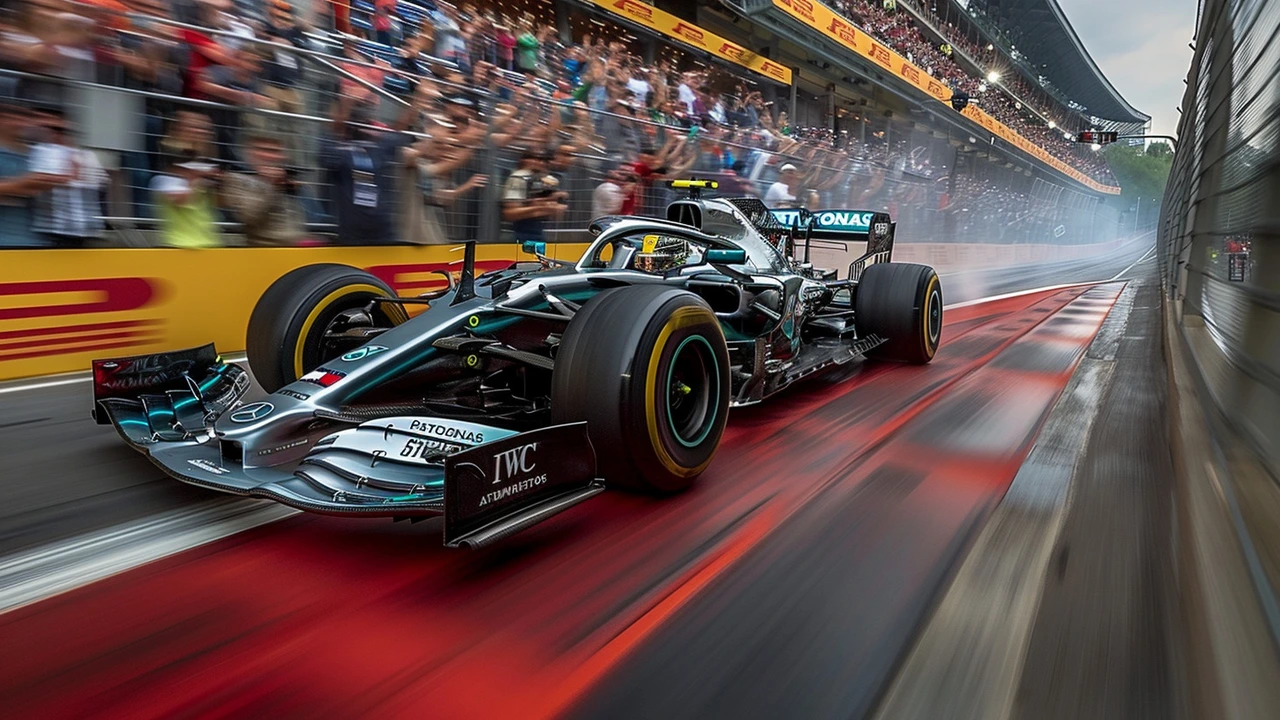Fernando Alonso Tops Rain-Affected FP2 Session at Canadian GP

Fernando Alonso Dominates Rain-Affected FP2 Session at Canadian Grand Prix
Fernando Alonso showcased his skill and experience, topping the timesheets during the second Free Practice (FP2) session for the Canadian Grand Prix. The session was characterized by evolving weather conditions, with a light rain falling intermittently. Drivers initially focused on gathering data using soft tires, but the unpredictable weather played a significant role in shaping the session's outcome.
The session commenced under overcast skies with a faint drizzle, prompting a cautious start from most drivers. French driver Pierre Gasly was the first to set a significant time, clocking in within the 1m20s range. However, the times began to tumble as the track conditions improved momentarily. It wasn't long before Alonso, driving for Aston Martin, took the top spot with a time of 1m17.835s, only to further improve to 1m16.668s.
Competition Heats Up Despite Weather
Alonso's time was briefly bested by his teammate, Lance Stroll, who capitalized on a brief dry spell. The session saw a flurry of fast laps from various drivers trying to optimize their runs before the weather worsened. Charles Leclerc, eager to make an impression, set a lap time of 1m16.556s, momentarily taking the lead. However, Leclerc was later penalized for using intermediate tires prematurely, negating his fastest lap. This allowed Alonso to reclaim his position at the top, setting an impressive time of 1m15.810s.
The rain intensified towards the latter part of the session, making it difficult for any driver to surpass Alonso's lap time. As a result, George Russell finished second, demonstrating consistent pace in his Mercedes. Lance Stroll rounded out the top three, providing a solid showing for Aston Martin in their home race weekend. The evolving conditions ensured a mix of strategies, with teams balancing the need for data collection and the risk of running in worsening conditions.
Challenges and Penalties Add Drama
The session wasn't devoid of drama, as several drivers experienced issues. Max Verstappen, a favorite heading into the weekend, reported a smoky smell emanating from his car's energy recovery system. This concern forced the Red Bull team to call him back to the garage for checks, limiting his running time. Similarly, McLaren's Lando Norris found himself under scrutiny from the stewards for not adhering to escape road instructions during the session.
Other notable performers included Lewis Hamilton, who, despite not having a favorable start to the weekend, managed to place seventh. Daniel Ricciardo showcased his adaptability, securing a commendable position in the top ten. Kevin Magnussen, driving for Haas, and Yuki Tsunoda, representing AlphaTauri, also featured prominently in the final standings. The session concluded with Alex Albon and Sergio Perez completing the top ten, both drivers navigating the tricky conditions with skill.

Focus Shifts to Remaining Sessions
As the drivers and teams digest the data from FP2, the focus now shifts to the remaining practice sessions and qualifying. Weather forecasts suggest the possibility of further rain, which could influence strategy and setup decisions. The Canadian Grand Prix, held at the Circuit Gilles Villeneuve, is renowned for its challenging layout and unpredictable conditions, promising an exciting weekend ahead.
Fernando Alonso's performance in FP2 not only highlights his prowess in varying conditions but also sets the stage for a potentially thrilling race. With the likes of Leclerc, Russell, and Verstappen eager to challenge, the upcoming sessions will be crucial in determining the pecking order. Fans and teams alike will be watching closely as the action unfolds in Montreal.
16 Comments
WILL WILLIAMS
Alonso's rain‑masterclass was pure fireworks! He turned the drizzle into a speedway, dropping lap times that left the rest choking on wet‑tread. This is why we love his tenacity!
Barry Hall
Nice work, Alonso! :)
abi rama
Seeing a veteran like Alonso adapt so quickly in fickle weather is a huge confidence boost for the whole field. It reminds us that experience still matters.
Megan Riley
Wow!! That was an absolute STORM of a session!!! Alonso??? More like a wizard on wet t‑track!! The rain may have been a challenge but he turned it into a showcase!! (typo) Keep it up!!
Lester Focke
One must acknowledge that Alonso’s performance, while commendable, underscores the prevailing inadequacies in the current aerodynamic packages of rival manufacturers, particularly under suboptimal track conditions.
Naveen Kumar Lokanatha
Alonso showed how important tyre strategy is especially when the sky decides to pour it on you the track guys keep an eye on those weather radars it's a great lesson for all teams
Alastair Moreton
Honestly, most of those mid‑field guys were just spinning their wheels. If you can't nail a wet lap, maybe stick to the simulator.
Surya Shrestha
Alonso’s lap time, 1:15.810, indisputably reflects a superior synthesis of driver skill, vehicle setup, and adaptive tactics, particularly noteworthy given the intermittent precipitation.
Rahul kumar
Quick tip: in wet conditions keep the rear camber a bit tighter and stay on the racing line as long as you can. That’s how Alonso got such grip despite the drizzle.
mary oconnell
Ah, the usual rain‑induced chaos, a perfect backdrop for the 'strategic acumen' of a seasoned pro-because nothing says “cutting edge” like hoping the clouds cooperate.
Michael Laffitte
Man, watching Alonso slice through the rain felt like watching a superhero land a perfect dive-pure cinematic gold!
sahil jain
Alonso proved once again that rain is just another playground for true champions, no need for emojis to celebrate his speed!
Bruce Moncrieff
It’s wild how the weather flips the script and Alonso just rides that wave like a pro the whole pack is left scrambling for data
Dee Boyd
The moral of this wet FP2 is simple: integrity in data collection outweighs any shortcut, yet teams keep pushing boundaries that skirt regulations.
Carol Wild
It’s astonishing how the media continues to glorify Alonso’s rain‑soaked laps as if they were some epic saga. The truth, however, is that the FIA’s timing systems have been under scrutiny for years. Rumor has it that certain data points were adjusted to favor drivers with strong sponsor backing. In this case, the Aston Martin team’s relationship with a major oil conglomerate could have subtly influenced the scoring algorithms. Moreover, the rain sensors on the circuit have a documented history of malfunctioning, leading to uneven grip levels across sectors. Some teams have reportedly received privileged access to the sensor calibration logs, giving them an unfair advantage. The fact that Leclerc’s lap was stripped due to an “intermediate tyre” penalty only adds fuel to the fire. One must wonder why such penalties are applied inconsistently, often targeting high‑profile drivers. The pattern is clear: the governing body is playing a delicate balancing act between spectacle and control. Spectacle, because the fans love drama, and control, because the elite stakeholders want to protect their investments. It’s no coincidence that the rain coincided with a major broadcast rights negotiation. This suggests a coordinated effort to maximize viewership numbers during a pivotal moment. Meanwhile, the smaller teams are left scrambling for data, their budgets draining faster than the rain drains off the track. The entire ecosystem feels rigged, a theater where the script is written behind closed doors. Until an independent audit is conducted, we can only speculate about the extent of manipulation. And that speculation is exactly what keeps the conspiracy forums alive.
Rahul Sharma
While speculation can be entertaining, there is no concrete evidence that the timing systems were tampered with. The FIA has published detailed logs that are publicly auditable. Moreover, Alonso’s performance aligns with his historic skill in variable conditions. Until proven otherwise, we should credit the driver’s talent rather than feed conspiracies.

Write a comment